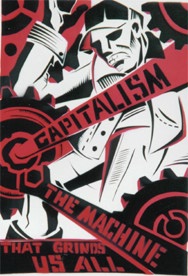First American National Strike - May Day - 2006
Submitted on Sun, 04/02/2006 - 11:53pm
Disclaimer - The following article is reposted here because it is an issue with some relevance to the IWW. The views of the author do not necessarily agree with those of the IWW and vice versa.
 Strike to support undocumented people's legalization
Strike to support undocumented people's legalization
Los Angeles, U.S., March 30, 2006 (Notimex) - The March 25 Coalition, who called for Saturday's march in Los Angeles, announced an "American national strike." This is part of its mobilizations to support the legalization of 12 million undocumented people in the US.
During a press conference, the leaders of the main Hispanic organizations stated that the Los Angeles historic march was only the beginning of a movement that will not be over until a wide and fair immigration reform is achieved.
While presenting their mobilizations program, the activists announced that next April 8 there will be a great assembly of the organizations that represent all the immigrants, in order to call for the "No-Latinos National Day."
They stated that the strike is programmed for May 1 and it is called the First American National Strike. This will not be exclusive, since they will make a call any kind of organizations.
Having that in mind, they said that a delegation will travel to Mexico to meet union organizations in that country, in order for them to have banners supporting undocumented workers during the May 1 (Labor Day) celebrations.
They stated that the strike, which they consider as a boycott, "will be cheap, workers will not leave their homes, children will not go to school, and there will not be consumption from certain companies that will be known, but they will only be those that have damaged undocumented workers."
Raul Murillo, director of the National Mexican Brotherhood in Los Angeles, stated that a delegation of some 100 organizations that participated in Saturday's march will travel to Washington and Mexico City, in order to get more support for the mobilization.
"The march that achieved to bring some one million people together in Los Angeles is just the top of the iceberg, and we won't give up or back up until the Congress and president George W. Bush have approved the legalization of the 12 million undocumented people," he warned.
Murillo took part in the press conference given in one of the offices in Los Angeles for the American Federation of Labor-Congress of Industrial Organizations (AFL-CIO), along with Nativo Lopez, leader or the Mexican Brotherhood Latin America and the Mexican-American Political Association (MAPA).
Also, in the press conference were Juan Jose Gutierrez, director of the USA Latino Movement; Gloria Saucedo, from the National Mexican Brotherhood in San Fernando Valley; the coalition's spokesman, Javier Rodriguez; and Hispanic radio station host Ricardo Sanchez, one of the march's promoters.
Sanchez stated that "during this achievement, no one took the recognition, nor individual publicity. We all assumed our responsibility and supported it from the beginning, and we were inviting people every day."
On the other hand, Gutierrez stated that although some changes may be seen in the Senate and that the HR 4437 Sensenbrenner initiative is apparently mortally wounded, "this movement will not stop until we reach legalization, respect, and recognition for the immigrants work in this country."
The US Senate's Judiciary Committee approved a wide initiative for an immigration reform, which includes the legalization of some 11 million undocumented immigrants.
The initiative, which was sent to the Senate to be discussed, also covers the legalization of 1.5 million agriculture workers in five years, a temporary workers plan for the future arrival of some 400 thousand immigrants a year, and the Dream Act, which grants special college support for the children of undocumented people.
Also, the plenary dismissed a controversial disposition that criminalized the undocumented people in the US, as well as those people giving them any kind of aid, including religious, humanitarian, and community groups.
American congressmen are expecting for the version approved in the Senate to be reconciled with James Sensenbrenner's proposal, which was passed by the House of Representatives last December, and which criminalizes undocumented immigration.